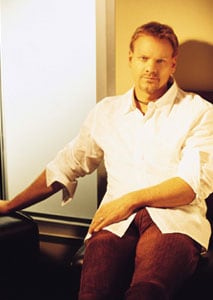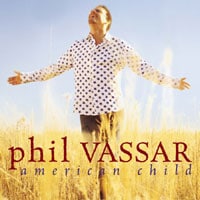Phil Vassar: Right Where He Wants to Be
BUENA PARK, CA (January 23, 2004) A lot of songs came out of Nashville in the wake of September 11, 2001, and again as war loomed in early 2003. And if a lot of them had a common denominator, it was anger and retribution. Phil Vassar had another idea.
"It was a song I wrote on the plane this spring," says the songwriter-turned-recording star, who's been a Yamaha artist for the last three years. "I write on planes a lot, and that day I was saying 'Man, what a wacky day in the news.'" The result was "This is God," a song about understanding: You fight each other in my name / Treat life like it's a foolish game / I'd say you've got the wrong idea The track impressed chiefs at Arista Records so much that they re-pressed Vassar's 2002 release, American Child, which was already on store shelves. With the new song and another bonus track, it enjoyed a renewed popularity, and Vassar was taken aback by the heartfelt response he got from people around the country. This is God has even become a 64-page book, published in April 2003 by Rutledge Hill Press. In it, Vassar offers sayings that expand on the theme of his song such as "I put you here for a reason," or "Bend a little. You're not always right." Arriving in Nashville in 1987, the Lynchburg, VA native soon established himself as one of the Music City's premier songwriters. "After a while I put together a demo tape, and the labels didn't like it," he recalls. "They hated it. You know, every one of the songs that was on that tape later became a number-one song."
His first break as a songwriter actually wasn't in the Nashville mold; he sold "Once in a While" to Engelbert Humperdinck ("He was a really cool guy," Vassar says) in 1996. But the way he kept himself in the public eye was very much in keeping with his new home; he opened his own night spot, the Hard Day's Nightclub, and spent plenty of time behind the ivories there. Signed to a songwriting contract with EMI, he wrote hits including "Little Red Rodeo" for Collin Raye, "Right on the Money" for Alan Jackson, "For a Little While" for Tim McGraw, "Bye Bye" and "I'm Alright" for Jo Dee Messina and "Postmarked Birmingham" for BlackHawk. He was named ASCAP's Country Songwriter of the Year in 1999.
Performing success followed songwriting success soon afterward. "Arista came around and said, 'Let's make a record,'" he recalls, no doubt simplifying the process somewhat. "It was really a lot of fun." The first album, Phil Vassar, came out in 2002, and like all his recordings since was performed on a Yamaha CFIIIS nine-foot grand. It spawned a raft of country Top Ten singles, including "Carlene," Six-Pack Summer," "That's When I Love You" and the number-one tune "Just Another Day in Paradise." In 2000, Vassar was Billboard magazine's Top New Country Artist of the Year and Music Row magazine's Breakthrough Artist of the Year. His accolades also include a 2002 American Country Music Award as Top New Male Vocalist and a 2001 ASCAP Country Artist/Songwriter of the Year Award. Despite his performing success, Vassar is still deeply involved in collaborating with other artists. He wrote and produced a song, "It's a Beautiful Life," for Kenny Rogers' 2003 CD Back to the Well (Dream Catcher Records). Vassar has a serious commitment to charity, and has become a spokesperson for the Wal-Mart Good Works Foundation's literacy program. He recorded a 2002 single, "Words Are Your Wheels," that's sold exclusively in their stores. In September 2003, he even played in a charity Monopoly game in Nashville to benefit Childhelp USA, which helps provide treatment, prevention and research for abused and neglected children. Vassar's third album, as yet untitled, will hit stores in spring 2004, with a possible single earlier in the wintertime. "It's a lot more piano-driven," he says. "I think the most interesting thing is there aren't really any front-man piano players here in Nashville, in a guitar town. I found myself trying to fit in more than I probably should have. But this one has several songs with just me and the piano, that I recorded in one take. I've been really lucky, because the record label really understands what I'm doing." "When I record, I make sure there's a good Yamaha piano," says Vassar, who adds that he has "a little stable of them" himself. "To me, they record so well. I love the way they sound. It's just a personal thing. Every piano's different, and you find one you feel comfortable with. When you put your hands on it, it feels good." For more information about Yamaha pianos, write Yamaha Corporation of America, Piano Division, P.O. Box 6600, Buena Park, CA 90622; telephone (714) 522-9011; e-mail infostation@yamaha.com.
|



